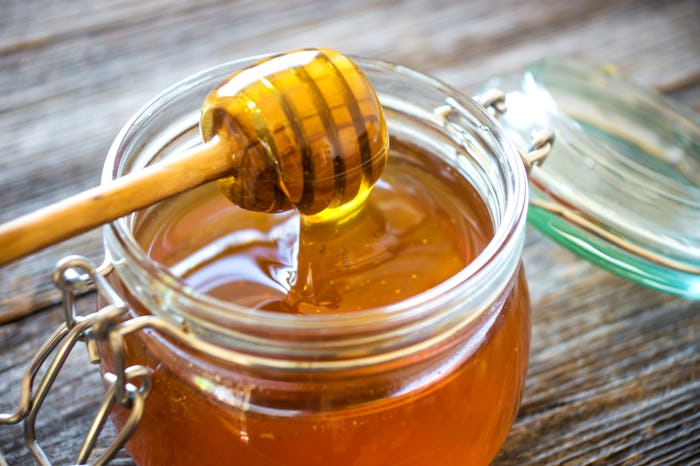Life

Here's When Your Baby Can Finally Get A Sweet Taste Of Honey
Once you become a parent, you begin to learn so many things you didn't know you needed to know. Completely ordinary, everyday things all of a sudden become potentially dangerous or even deadly. I remember when my son was a baby, one of the things I had never heard before was the "no honey" rule. While I wasn't planning on giving him honey (I hadn't even thought about it), learning that honey could be potentially deadly to infants was alarming. So, is the no honey rule a thing? If so, when can babies have honey? I checked in with some experts and did the research so you don't have to.
In an email, pediatrician Dr. Natasha Burgert of KC Kids Doc explains to Romper that infants younger than 1 year old should not consume honey because of the potential for them to develop a deadly disease called botulism. According to the Centers for Disease Control and Prevention (CDC), honey can contain a bacteria named Clostridium botulinum. This bacteria can turn into a toxin and cause this serious and potentially deadly illness. It's also "spread by food" or "found naturally in many places," but doesn't always make people sick. In fact, it's rare, but it becomes dangerous when it begins to grow in environments where the spores are protected, such as poorly canned goods. While the CDC states that commercial canned goods are normally completely safe because they are required to practice proper canning procedures, at-home canning may be dangerous if not done properly. Enter, honey. The CDC explains that honey can contain these spores which, in older children and adults, are completely harmless. But it is dangerous for infants because their digestive system isn't mature enough to reject the bacteria making them very sick as a result.
The CDC further explains on their website that this kind of bacteria will attack the nervous system and can paralyze the diaphragm so the baby can't breathe. I know — cue the anxiety. Other symptoms of this type of poisoning in infants are lethargy, loss of appetite, constipation, poor muscle tone or control (think rag doll), and a weak cry. If left untreated, botulism can lead to muscle paralysis, including muscles that are essential to breathing. No wonder doctors advise against giving babies honey — this is scary stuff. Don't freak out yet though, this kind of poisoning is very rare and in many cases, totally preventable.
I began questioning this whole honey thing when I learned about the Hindu Cradle Ceremony where a mother would hold her newborn infant and feed it a milk and honey mixture. If honey was dangerous to infants, then how could this ritual have survived for so many generations if not thousands of years? I was curious, so I looked into this and learned that this custom was indeed developed long before western medicine uncovered the potential dangers of honey. There is a wonderfully written article on this subject from a cultural perspective with commentary from an Indian medical doctor and mother who explain why this practice is still happening today.
While the chances of your baby being exposed to this type of dangerous bacteria is very rare, it's reassuring to know that we as caregivers can take measures to prevent this dangerous illness from harming our babies. While as an adult I'll continue to take honey in my coffee every morning, I know better than to bring it around any infants younger than 12 months. So go ahead and enjoy your honey responsibly, moms, and wait until that first birthday passes before sharing with your baby.